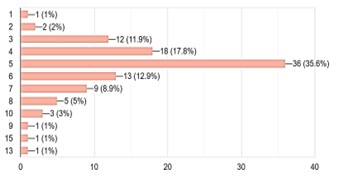Household Solid Waste Management (HSWM) Awareness and Applications: A Comparative Study on Urban and Rural Sustainable Practices
Main Article Content
Abstract
Solid Waste Management has been a problem for rural and urban communities. The study aims to provide a basis for urban and rural communities to improve their awareness, attitudes, and practices on solid waste management at a household level and collaborate with local government units toward effective Household Solid Waste Management (HSWM) implementation, ordinances, and mitigation. A 30-item close-ended assessment with 5-item follow-up questions was constructed to determine and compare the level of awareness, attitudes, and practices on HSWM between Barangay Bignay, Valenzuela (urban group), and Barangay Santa Elena, Hagonoy (rural group). The data was analyzed using One Way Analysis of Variance (ANOVA) to know the significant relationship between the bases (i.e., awareness, attitudes, and practices) in both barangays. Findings showed that the awareness of HSWM, practices, and attitude was high in the urban area, having a p-value of 0.003474, a lesser p-value than in rural with 0.007341. The comparisons analyzed using ANOVA reflecting a p-value of 0.96 concluded that there is a significant difference between the bases on the two groups since it is greater than the 0.50 level of significance. The bases were determined to have a positive relationship and thus directly affect the respondents' applications on HSWM and their communities. The LGUs implement an SWM program but still needs improvement as these contradict the measured practices. The study suggests a stricter implementation and orientation for both barangays on solid management programs.
Downloads
Article Details
Authors who publish with this journal agree to the following terms:
- Copyright of the published article belongs to the authors and grant the journal right of first publication with the work simultaneously licensed under a Creative Commons Attribution-ShareAlike 4.0 (CC BY SA) International License that allows others to share the work with an acknowledgment of the work's authorship and initial publication in this journal.
- Authors are able to enter into separate, additional contractual arrangements for the non-exclusive distribution of the journal's published version of the work (e.g., post it to an institutional repository or publish it in a book), with an acknowledgment of its initial publication in this journal.
- Authors are permitted and encouraged to post their work online (e.g., in institutional repositories or on their website) prior to and during the submission process, as it can lead to productive exchanges, as well as earlier and greater citation of published work (See the Effect of Open Access).
References
M. D. LaGrega, P. L. Buckingham, and J. C. Evans, Hazardous waste management. Waveland Press, 2010.
Y. C. Moh and L. Abd Manaf, “Overview of household solid waste recycling policy status and challenges in Malaysia,” Resour. Conserv. Recycl., vol. 82, pp. 50–61, 2014.
P. R. White, M. Franke, and P. Hindle, Integrated Solid Waste Management: A Lifecycle Inventory: A Lifecycle Inventory. Springer Science & Business Media, 1995.
S. Gupta, K. Mohan, R. Prasad, S. Gupta, and A. Kansal, “Solid waste management in India: options and opportunities,” Resour. Conserv. Recycl., vol. 24, no. 2, pp. 137–154, 1998.
H. Zia and V. Devadas, “Municipal solid waste management in Kanpur, India: obstacles and prospects,” Manag. Environ. Qual. An Int. J., 2007.
A. Mahar, R. N. Malik, A. Qadir, T. Ahmed, Z. Khan, and M. A. Khan, “Review and analysis of current solid waste management situation in urban areas of Pakistan,” in Proceedings of the international conference on sustainable solid waste management, 2007, vol. 8, p. 36.
S. A. Batool and M. N. Ch, “Municipal solid waste management in Lahore city district, Pakistan,” Waste Manag., vol. 29, no. 6, pp. 1971–1981, 2009.
C. D. Licy, R. Vivek, K. Saritha, T. K. Anies, and C. T. Josphina, “Awareness, attitude and practice of school students towards household waste management,” J. Environ., vol. 2, no. 6, pp. 147–150, 2013.
E. Maibach, “Social marketing for the environment: Using information campaigns to promote environmental awareness and behavior change,” Health Promot. Int., vol. 8, no. 3, pp. 209–224, 1993.
A. Kollmuss and J. Agyeman, “Mind the gap: why do people act environmentally and what are the barriers to pro-environmental behavior?,” Environ. Educ. Res., vol. 8, no. 3, pp. 239–260, 2002.
A. B. Cervania, A. C. Perdio, D. S. Llave, and A. B. Zapanta, “Bataan coastal Resource management programs: Environmental, socio-economic, and implementation issues from stakeholders’ views,” Asia Pacific J. Multidiscip. Res., vol. 6, no. 1, pp. 46–58, 2018.
D. Mmereki, “Current status of waste management in Botswana: A mini-review,” Waste Manag. Res., vol. 36, no. 7, pp. 555–576, 2018.
G. P. Sapuay, “Resource recovery through RDF: Current trends in solid waste management in the Philippines,” Procedia Environ. Sci., vol. 35, pp. 464–473, 2016.
S. Boateng, P. Amoako, D. O. Appiah, A. A. Poku, and E. K. Garsonu, “Comparative analysis of households solid waste management in rural and urban Ghana,” J. Environ. Public Health, vol. 2016, 2016.
B. Asante, E. Yanful, and B. Yaokumah, “Healthcare Waste Management; Its Impact: A Case Study Of The Greater Accra Region, Ghana.,” Int. J. Sci. Technol. Res., vol. 3, no. 3, 2014.
M. Oteng-Ababio, “Missing links in solid waste management in the Greater Accra Metropolitan Area in Ghana,” GeoJournal, vol. 76, no. 5, pp. 551–560, 2011.
H. I. Jeremias and F. M. D. Fellizar, “Knowledge, Awareness, Perceptions, and Practices on Solid Waste Management of Households in Selected Urban Barangays in Sorsogon City, Sorsogon, Philippines,” J. Hum. Ecol., vol. 8, no. 1, 2019.

